Types of foster families Adult Care Adult care
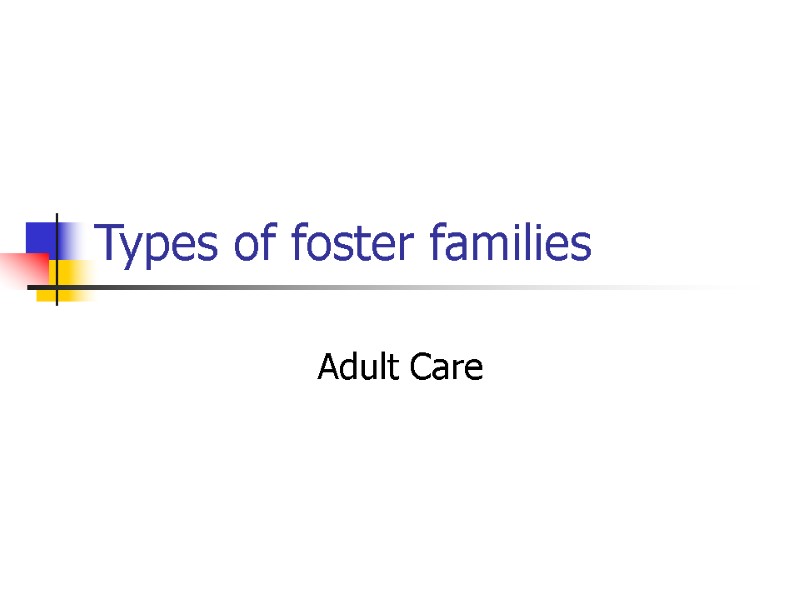
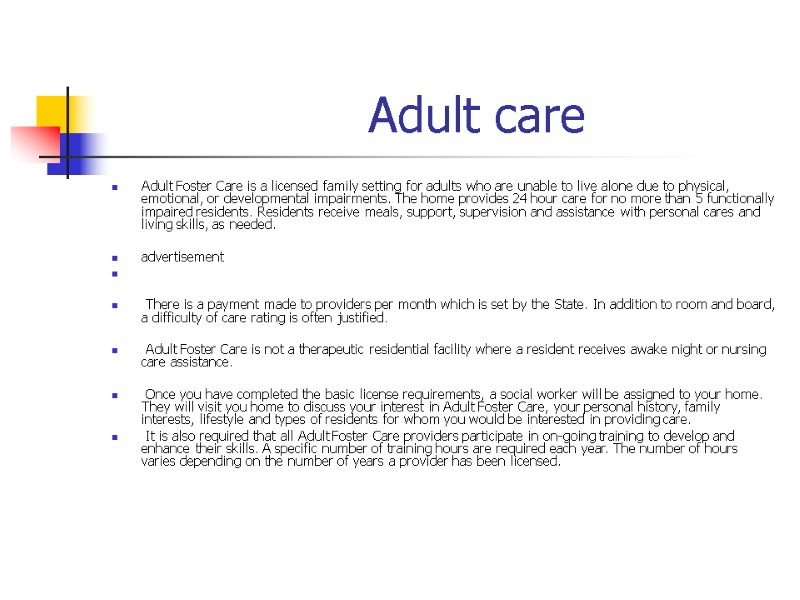
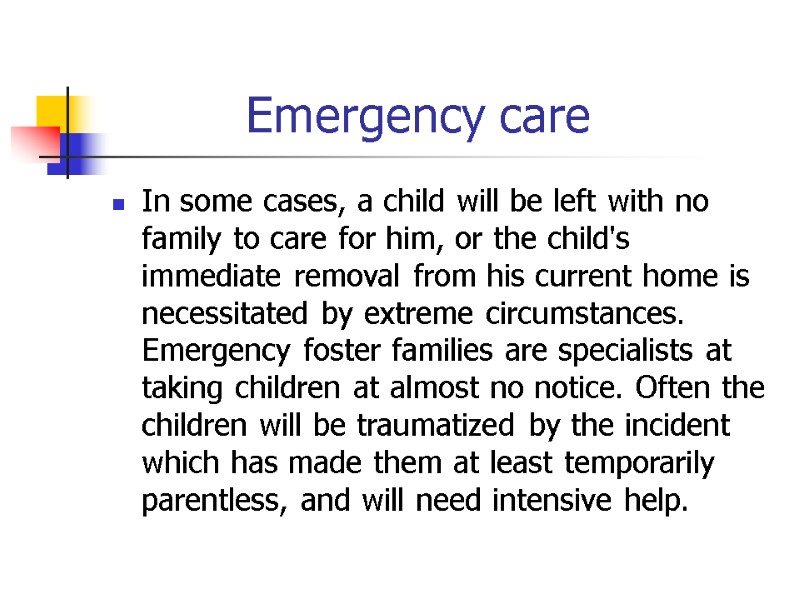
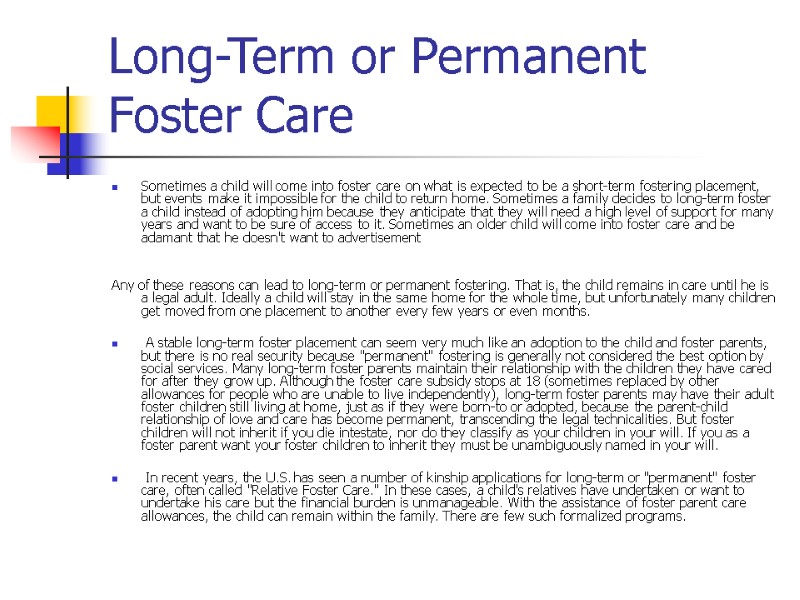
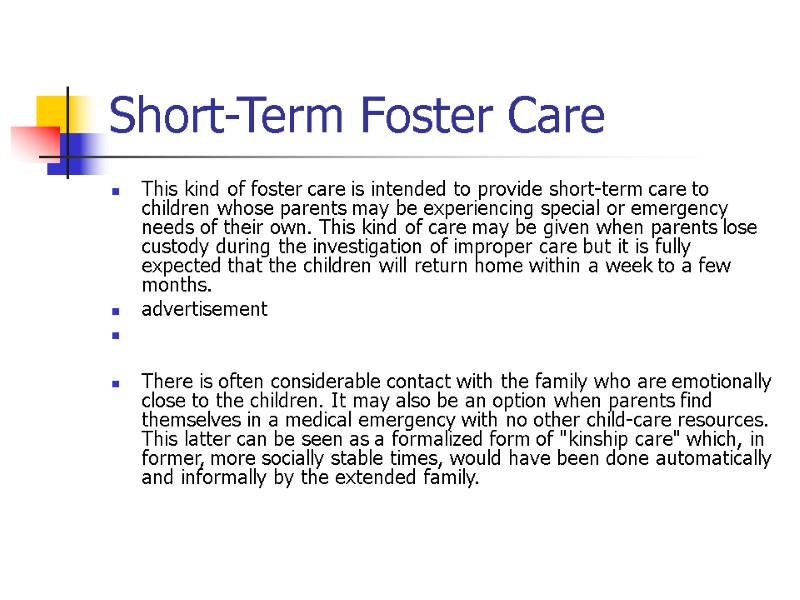
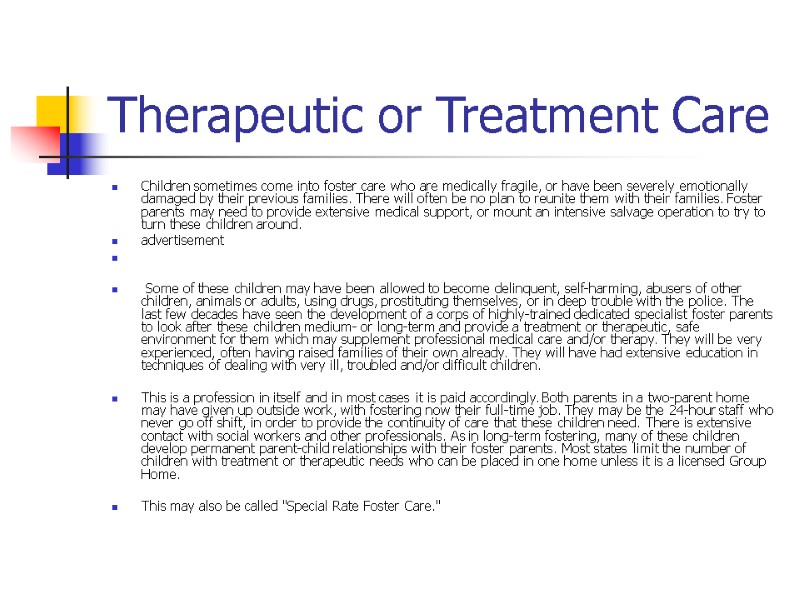
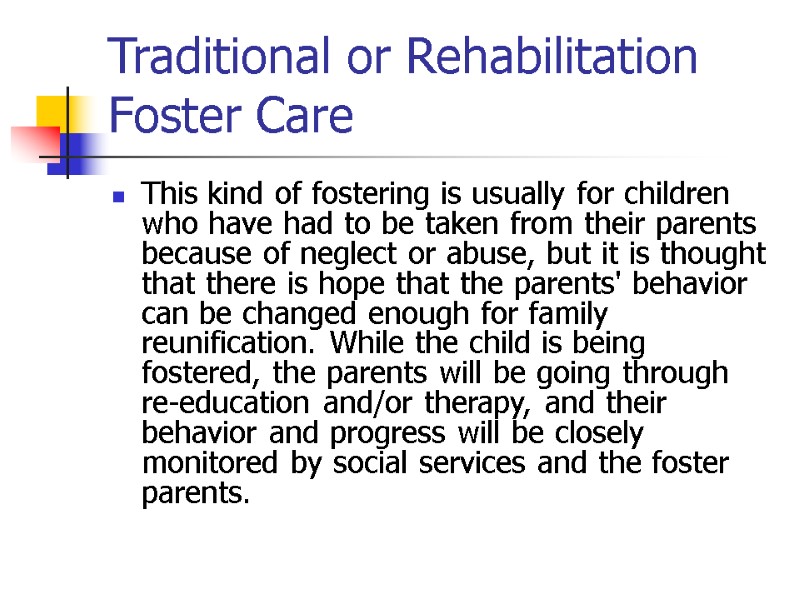
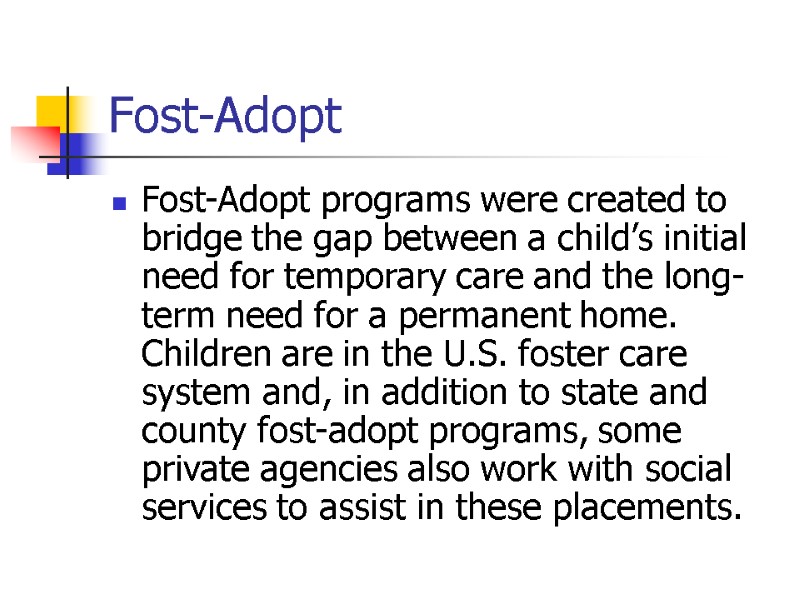
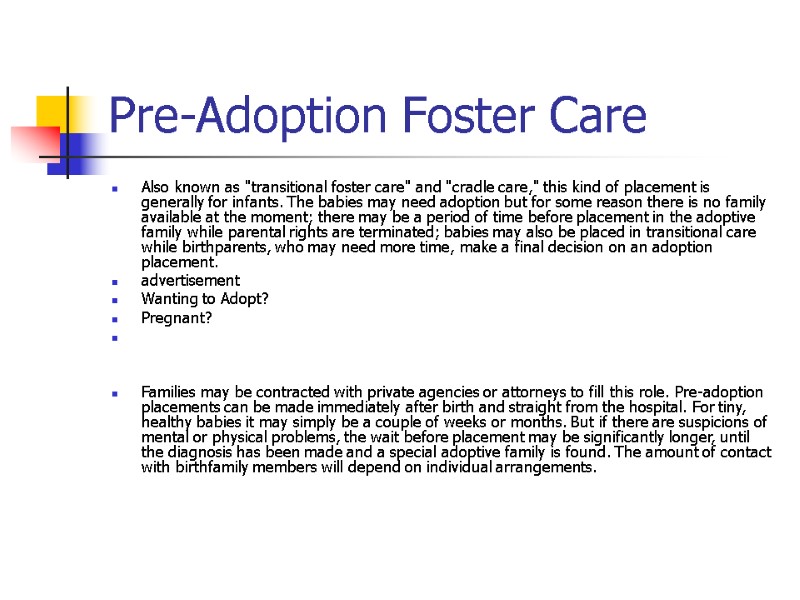
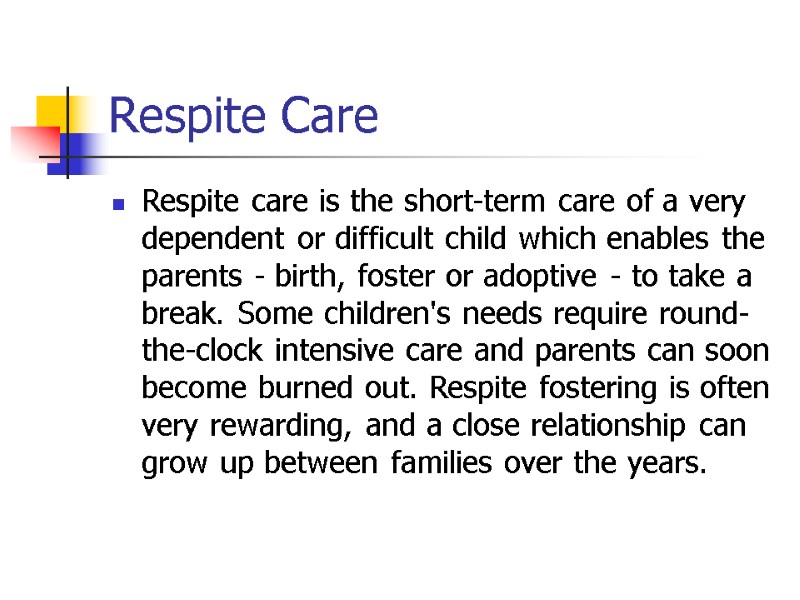
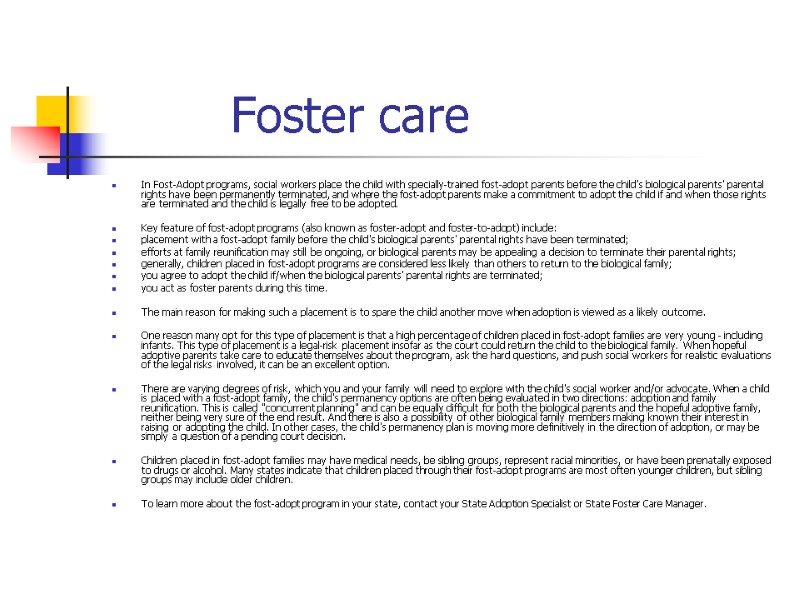
15654-types_of_foster_families.ppt
- Количество слайдов: 11
 Types of foster families Adult Care
Types of foster families Adult Care
 Adult care Adult Foster Care is a licensed family setting for adults who are unable to live alone due to physical, emotional, or developmental impairments. The home provides 24 hour care for no more than 5 functionally impaired residents. Residents receive meals, support, supervision and assistance with personal cares and living skills, as needed. advertisement There is a payment made to providers per month which is set by the State. In addition to room and board, a difficulty of care rating is often justified. Adult Foster Care is not a therapeutic residential facility where a resident receives awake night or nursing care assistance. Once you have completed the basic license requirements, a social worker will be assigned to your home. They will visit you home to discuss your interest in Adult Foster Care, your personal history, family interests, lifestyle and types of residents for whom you would be interested in providing care. It is also required that all Adult Foster Care providers participate in on-going training to develop and enhance their skills. A specific number of training hours are required each year. The number of hours varies depending on the number of years a provider has been licensed.
Adult care Adult Foster Care is a licensed family setting for adults who are unable to live alone due to physical, emotional, or developmental impairments. The home provides 24 hour care for no more than 5 functionally impaired residents. Residents receive meals, support, supervision and assistance with personal cares and living skills, as needed. advertisement There is a payment made to providers per month which is set by the State. In addition to room and board, a difficulty of care rating is often justified. Adult Foster Care is not a therapeutic residential facility where a resident receives awake night or nursing care assistance. Once you have completed the basic license requirements, a social worker will be assigned to your home. They will visit you home to discuss your interest in Adult Foster Care, your personal history, family interests, lifestyle and types of residents for whom you would be interested in providing care. It is also required that all Adult Foster Care providers participate in on-going training to develop and enhance their skills. A specific number of training hours are required each year. The number of hours varies depending on the number of years a provider has been licensed.
 Emergency care In some cases, a child will be left with no family to care for him, or the child's immediate removal from his current home is necessitated by extreme circumstances. Emergency foster families are specialists at taking children at almost no notice. Often the children will be traumatized by the incident which has made them at least temporarily parentless, and will need intensive help.
Emergency care In some cases, a child will be left with no family to care for him, or the child's immediate removal from his current home is necessitated by extreme circumstances. Emergency foster families are specialists at taking children at almost no notice. Often the children will be traumatized by the incident which has made them at least temporarily parentless, and will need intensive help.
 Long-Term or Permanent Foster Care Sometimes a child will come into foster care on what is expected to be a short-term fostering placement, but events make it impossible for the child to return home. Sometimes a family decides to long-term foster a child instead of adopting him because they anticipate that they will need a high level of support for many years and want to be sure of access to it. Sometimes an older child will come into foster care and be adamant that he doesn't want to advertisement Any of these reasons can lead to long-term or permanent fostering. That is, the child remains in care until he is a legal adult. Ideally a child will stay in the same home for the whole time, but unfortunately many children get moved from one placement to another every few years or even months. A stable long-term foster placement can seem very much like an adoption to the child and foster parents, but there is no real security because "permanent" fostering is generally not considered the best option by social services. Many long-term foster parents maintain their relationship with the children they have cared for after they grow up. Although the foster care subsidy stops at 18 (sometimes replaced by other allowances for people who are unable to live independently), long-term foster parents may have their adult foster children still living at home, just as if they were born-to or adopted, because the parent-child relationship of love and care has become permanent, transcending the legal technicalities. But foster children will not inherit if you die intestate, nor do they classify as your children in your will. If you as a foster parent want your foster children to inherit they must be unambiguously named in your will. In recent years, the U.S. has seen a number of kinship applications for long-term or "permanent" foster care, often called "Relative Foster Care." In these cases, a child's relatives have undertaken or want to undertake his care but the financial burden is unmanageable. With the assistance of foster parent care allowances, the child can remain within the family. There are few such formalized programs.
Long-Term or Permanent Foster Care Sometimes a child will come into foster care on what is expected to be a short-term fostering placement, but events make it impossible for the child to return home. Sometimes a family decides to long-term foster a child instead of adopting him because they anticipate that they will need a high level of support for many years and want to be sure of access to it. Sometimes an older child will come into foster care and be adamant that he doesn't want to advertisement Any of these reasons can lead to long-term or permanent fostering. That is, the child remains in care until he is a legal adult. Ideally a child will stay in the same home for the whole time, but unfortunately many children get moved from one placement to another every few years or even months. A stable long-term foster placement can seem very much like an adoption to the child and foster parents, but there is no real security because "permanent" fostering is generally not considered the best option by social services. Many long-term foster parents maintain their relationship with the children they have cared for after they grow up. Although the foster care subsidy stops at 18 (sometimes replaced by other allowances for people who are unable to live independently), long-term foster parents may have their adult foster children still living at home, just as if they were born-to or adopted, because the parent-child relationship of love and care has become permanent, transcending the legal technicalities. But foster children will not inherit if you die intestate, nor do they classify as your children in your will. If you as a foster parent want your foster children to inherit they must be unambiguously named in your will. In recent years, the U.S. has seen a number of kinship applications for long-term or "permanent" foster care, often called "Relative Foster Care." In these cases, a child's relatives have undertaken or want to undertake his care but the financial burden is unmanageable. With the assistance of foster parent care allowances, the child can remain within the family. There are few such formalized programs.
 Short-Term Foster Care This kind of foster care is intended to provide short-term care to children whose parents may be experiencing special or emergency needs of their own. This kind of care may be given when parents lose custody during the investigation of improper care but it is fully expected that the children will return home within a week to a few months. advertisement There is often considerable contact with the family who are emotionally close to the children. It may also be an option when parents find themselves in a medical emergency with no other child-care resources. This latter can be seen as a formalized form of "kinship care" which, in former, more socially stable times, would have been done automatically and informally by the extended family.
Short-Term Foster Care This kind of foster care is intended to provide short-term care to children whose parents may be experiencing special or emergency needs of their own. This kind of care may be given when parents lose custody during the investigation of improper care but it is fully expected that the children will return home within a week to a few months. advertisement There is often considerable contact with the family who are emotionally close to the children. It may also be an option when parents find themselves in a medical emergency with no other child-care resources. This latter can be seen as a formalized form of "kinship care" which, in former, more socially stable times, would have been done automatically and informally by the extended family.
 Therapeutic or Treatment Care Children sometimes come into foster care who are medically fragile, or have been severely emotionally damaged by their previous families. There will often be no plan to reunite them with their families. Foster parents may need to provide extensive medical support, or mount an intensive salvage operation to try to turn these children around. advertisement Some of these children may have been allowed to become delinquent, self-harming, abusers of other children, animals or adults, using drugs, prostituting themselves, or in deep trouble with the police. The last few decades have seen the development of a corps of highly-trained dedicated specialist foster parents to look after these children medium- or long-term and provide a treatment or therapeutic, safe environment for them which may supplement professional medical care and/or therapy. They will be very experienced, often having raised families of their own already. They will have had extensive education in techniques of dealing with very ill, troubled and/or difficult children. This is a profession in itself and in most cases it is paid accordingly. Both parents in a two-parent home may have given up outside work, with fostering now their full-time job. They may be the 24-hour staff who never go off shift, in order to provide the continuity of care that these children need. There is extensive contact with social workers and other professionals. As in long-term fostering, many of these children develop permanent parent-child relationships with their foster parents. Most states limit the number of children with treatment or therapeutic needs who can be placed in one home unless it is a licensed Group Home. This may also be called "Special Rate Foster Care."
Therapeutic or Treatment Care Children sometimes come into foster care who are medically fragile, or have been severely emotionally damaged by their previous families. There will often be no plan to reunite them with their families. Foster parents may need to provide extensive medical support, or mount an intensive salvage operation to try to turn these children around. advertisement Some of these children may have been allowed to become delinquent, self-harming, abusers of other children, animals or adults, using drugs, prostituting themselves, or in deep trouble with the police. The last few decades have seen the development of a corps of highly-trained dedicated specialist foster parents to look after these children medium- or long-term and provide a treatment or therapeutic, safe environment for them which may supplement professional medical care and/or therapy. They will be very experienced, often having raised families of their own already. They will have had extensive education in techniques of dealing with very ill, troubled and/or difficult children. This is a profession in itself and in most cases it is paid accordingly. Both parents in a two-parent home may have given up outside work, with fostering now their full-time job. They may be the 24-hour staff who never go off shift, in order to provide the continuity of care that these children need. There is extensive contact with social workers and other professionals. As in long-term fostering, many of these children develop permanent parent-child relationships with their foster parents. Most states limit the number of children with treatment or therapeutic needs who can be placed in one home unless it is a licensed Group Home. This may also be called "Special Rate Foster Care."
 Traditional or Rehabilitation Foster Care This kind of fostering is usually for children who have had to be taken from their parents because of neglect or abuse, but it is thought that there is hope that the parents' behavior can be changed enough for family reunification. While the child is being fostered, the parents will be going through re-education and/or therapy, and their behavior and progress will be closely monitored by social services and the foster parents.
Traditional or Rehabilitation Foster Care This kind of fostering is usually for children who have had to be taken from their parents because of neglect or abuse, but it is thought that there is hope that the parents' behavior can be changed enough for family reunification. While the child is being fostered, the parents will be going through re-education and/or therapy, and their behavior and progress will be closely monitored by social services and the foster parents.
 Fost-Adopt Fost-Adopt programs were created to bridge the gap between a child’s initial need for temporary care and the long-term need for a permanent home. Children are in the U.S. foster care system and, in addition to state and county fost-adopt programs, some private agencies also work with social services to assist in these placements.
Fost-Adopt Fost-Adopt programs were created to bridge the gap between a child’s initial need for temporary care and the long-term need for a permanent home. Children are in the U.S. foster care system and, in addition to state and county fost-adopt programs, some private agencies also work with social services to assist in these placements.
 Pre-Adoption Foster Care Also known as "transitional foster care" and "cradle care," this kind of placement is generally for infants. The babies may need adoption but for some reason there is no family available at the moment; there may be a period of time before placement in the adoptive family while parental rights are terminated; babies may also be placed in transitional care while birthparents, who may need more time, make a final decision on an adoption placement. advertisement Wanting to Adopt? Pregnant? Families may be contracted with private agencies or attorneys to fill this role. Pre-adoption placements can be made immediately after birth and straight from the hospital. For tiny, healthy babies it may simply be a couple of weeks or months. But if there are suspicions of mental or physical problems, the wait before placement may be significantly longer, until the diagnosis has been made and a special adoptive family is found. The amount of contact with birthfamily members will depend on individual arrangements.
Pre-Adoption Foster Care Also known as "transitional foster care" and "cradle care," this kind of placement is generally for infants. The babies may need adoption but for some reason there is no family available at the moment; there may be a period of time before placement in the adoptive family while parental rights are terminated; babies may also be placed in transitional care while birthparents, who may need more time, make a final decision on an adoption placement. advertisement Wanting to Adopt? Pregnant? Families may be contracted with private agencies or attorneys to fill this role. Pre-adoption placements can be made immediately after birth and straight from the hospital. For tiny, healthy babies it may simply be a couple of weeks or months. But if there are suspicions of mental or physical problems, the wait before placement may be significantly longer, until the diagnosis has been made and a special adoptive family is found. The amount of contact with birthfamily members will depend on individual arrangements.
 Respite Care Respite care is the short-term care of a very dependent or difficult child which enables the parents - birth, foster or adoptive - to take a break. Some children's needs require round-the-clock intensive care and parents can soon become burned out. Respite fostering is often very rewarding, and a close relationship can grow up between families over the years.
Respite Care Respite care is the short-term care of a very dependent or difficult child which enables the parents - birth, foster or adoptive - to take a break. Some children's needs require round-the-clock intensive care and parents can soon become burned out. Respite fostering is often very rewarding, and a close relationship can grow up between families over the years.
 Foster care In Fost-Adopt programs, social workers place the child with specially-trained fost-adopt parents before the child's biological parents' parental rights have been permanently terminated, and where the fost-adopt parents make a commitment to adopt the child if and when those rights are terminated and the child is legally free to be adopted. Key feature of fost-adopt programs (also known as foster-adopt and foster-to-adopt) include: placement with a fost-adopt family before the child's biological parents' parental rights have been terminated; efforts at family reunification may still be ongoing, or biological parents may be appealing a decision to terminate their parental rights; generally, children placed in fost-adopt programs are considered less likely than others to return to the biological family; you agree to adopt the child if/when the biological parents' parental rights are terminated; you act as foster parents during this time. The main reason for making such a placement is to spare the child another move when adoption is viewed as a likely outcome. One reason many opt for this type of placement is that a high percentage of children placed in fost-adopt families are very young - including infants. This type of placement is a legal-risk placement insofar as the court could return the child to the biological family. When hopeful adoptive parents take care to educate themselves about the program, ask the hard questions, and push social workers for realistic evaluations of the legal risks involved, it can be an excellent option. There are varying degrees of risk, which you and your family will need to explore with the child's social worker and/or advocate. When a child is placed with a fost-adopt family, the child's permanency options are often being evaluated in two directions: adoption and family reunification. This is called "concurrent planning" and can be equally difficult for both the biological parents and the hopeful adoptive family, neither being very sure of the end result. And there is also a possibility of other biological family members making known their interest in raising or adopting the child. In other cases, the child's permanency plan is moving more definitively in the direction of adoption, or may be simply a question of a pending court decision. Children placed in fost-adopt families may have medical needs, be sibling groups, represent racial minorities, or have been prenatally exposed to drugs or alcohol. Many states indicate that children placed through their fost-adopt programs are most often younger children, but sibling groups may include older children. To learn more about the fost-adopt program in your state, contact your State Adoption Specialist or State Foster Care Manager.
Foster care In Fost-Adopt programs, social workers place the child with specially-trained fost-adopt parents before the child's biological parents' parental rights have been permanently terminated, and where the fost-adopt parents make a commitment to adopt the child if and when those rights are terminated and the child is legally free to be adopted. Key feature of fost-adopt programs (also known as foster-adopt and foster-to-adopt) include: placement with a fost-adopt family before the child's biological parents' parental rights have been terminated; efforts at family reunification may still be ongoing, or biological parents may be appealing a decision to terminate their parental rights; generally, children placed in fost-adopt programs are considered less likely than others to return to the biological family; you agree to adopt the child if/when the biological parents' parental rights are terminated; you act as foster parents during this time. The main reason for making such a placement is to spare the child another move when adoption is viewed as a likely outcome. One reason many opt for this type of placement is that a high percentage of children placed in fost-adopt families are very young - including infants. This type of placement is a legal-risk placement insofar as the court could return the child to the biological family. When hopeful adoptive parents take care to educate themselves about the program, ask the hard questions, and push social workers for realistic evaluations of the legal risks involved, it can be an excellent option. There are varying degrees of risk, which you and your family will need to explore with the child's social worker and/or advocate. When a child is placed with a fost-adopt family, the child's permanency options are often being evaluated in two directions: adoption and family reunification. This is called "concurrent planning" and can be equally difficult for both the biological parents and the hopeful adoptive family, neither being very sure of the end result. And there is also a possibility of other biological family members making known their interest in raising or adopting the child. In other cases, the child's permanency plan is moving more definitively in the direction of adoption, or may be simply a question of a pending court decision. Children placed in fost-adopt families may have medical needs, be sibling groups, represent racial minorities, or have been prenatally exposed to drugs or alcohol. Many states indicate that children placed through their fost-adopt programs are most often younger children, but sibling groups may include older children. To learn more about the fost-adopt program in your state, contact your State Adoption Specialist or State Foster Care Manager.
